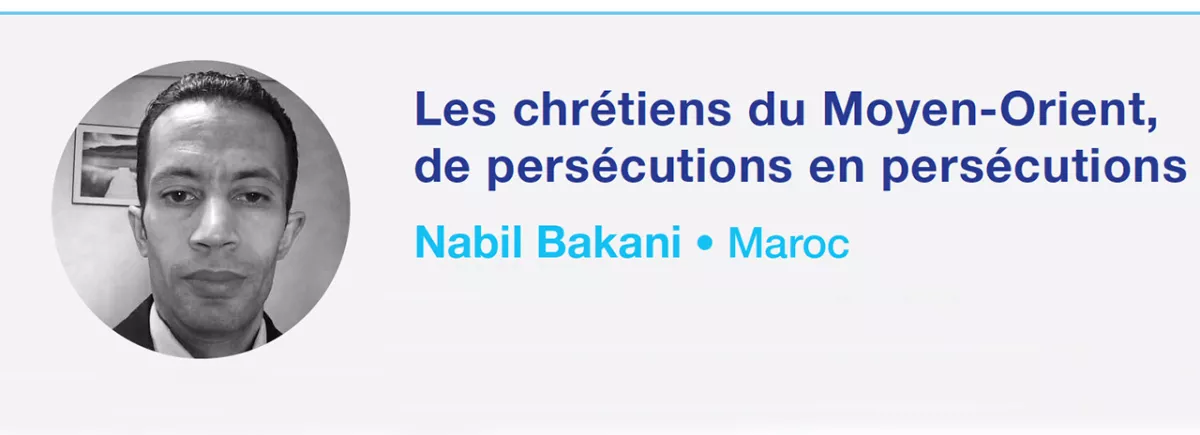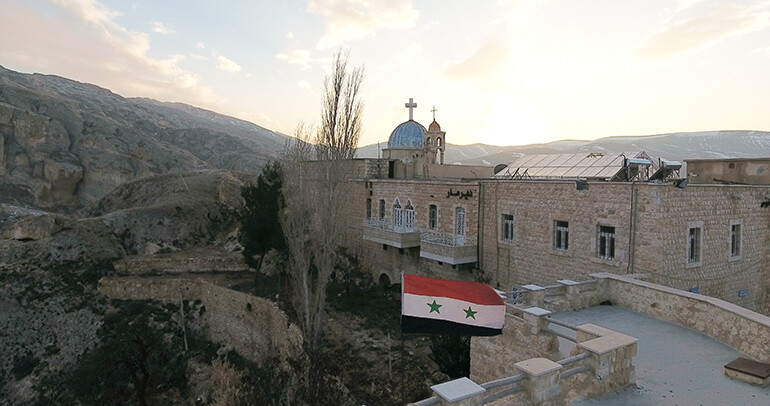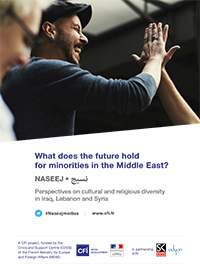
Christians of the Middle East, persecutions upon persecutions
Related project
NaseejDiscover a selection of the best articles dealing with cultural and religious diversity in the Middle East, entered in the Naseej competition launched by CFI and SKeyes in October 2017.
This week, Moroccan journalist Nabil Bakani recounts the persecutions that Christians have endured over the centuries in Iraq and Syria, but also in Libya and Egypt.
Published in Rai Al Youm on 13 Januaray 2017
There is no doubting the fact that armed combat in the Middle East's regions of conflict spares neither ethnic groups nor religions. But what is certain, according to reports by the media and other sources, is that out of the civilian population, it is minorities, whether religious or ethnic, who are the victims targeted the most. There is no denying the fact that religious minorities and minority communities such as the Yazidi, Shia, Kurds and Druze, and those faithful to the Christian religion of all denominations and churches, remain the most targeted in the regions of conflict, even though they are the most numerous and have been living in these lands for centuries.
The persecution of Christians is not specific to hotbeds of tension in the Middle East, such as in Syria and Iraq. It also concerns regions that enjoy some degree of stability and security but display deep political divisions, such as in Egypt, which cannot be excluded from the list of countries where Christians are persecuted.
This persecution is not new, but historic reasons have led other communities to refer to Christians as "seekers of protection" whereas the lands they inhabited belonged to them. Christianity emerged from this region of the world, it is the cradle of all monotheistic religions and remained the official religion up until the 4th century. Until the end of the 20th century, it represented 20% of the world population. Even though they have lived in this region for over two thousand years, Christians currently represent just 5% of the population. Over the course of time, they have always fallen victim to the covetousness of dictatorial Arab regimes and leaders. These events have caused their mass migration, which has contributed to their reduction in number. Their suffering has been deemed very harsh at several times in history, notably during the events of 1915 and 1917 and the campaigns of genocide conducted against the Armenians of the Ottoman Empire, who were persecuted because of their Christian faith. Sources point to the involvement of the secular Young Turks nationalist movement that led the revolution of 1908. Others also point out that Turkey had signed a secret treaty with Germany, its ally in 1914, stipulating the change to the Eastern border of the Ottoman Empire to include a passage leading to the Muslim communities in Russia. This entailed the eradication of the Armenians in this region, in order to reunite the Ottoman people, faced with the First World War.

Freedom and dignity
Such is the case too in modern republics that have formally adopted the nation state system.
Their suffering is no less atrocious than they experienced before. Christians have not escaped the ambitions and political manoeuvres serving narrow interests. They have kept their position at the top of the list of people targeted the most by dictatorial regimes. After years of discrimination, whether in Egypt, in Mubarak's day, or under the reign of Saddam Hussein in Iraq or that of the al-Assad family in Syria, many people united to protest as part of the Arab Spring demonstrations, under the banner of freedom and dignity. After the fall of Mubarak's regime, Egypt's Christians and, at the same time, their counterparts in the region, savoured the hope of living in a new State. A State founded on the basis of citizenship, guaranteed by law and the Constitution, within the framework of a whole set of rights that everybody must enjoy on an equal footing, and not based on ethnic, sectarian or hereditary distinctions or any other aspects on which the "modern" States were based after independence. The hope felt by Christians took little time to turn to tragedy, and instead of gaining individual equality and liberty, they once again found themselves forced to renounce what was left of their rights.
Although Egypt was in the habit of appointing two Coptic government ministers, this was more for cosmetic effect and masked the fact that several posts in the civil service were still denied to all Coptic Christians. Their situation deteriorated under the regime of the Muslim Brotherhood, to a degree that is unprecedented in Egypt's modern history.
Nothing has changed after that under Abdel Fattah el-Sisi, who came to power after the fall of the Morsi regime, and who rules with an iron fist. Such is the situation in Egypt, a country that enjoys a certain degree of stability and security. In other regions, in Syria and Iraq, where armed conflict rages – and taking a quick glance at the number of Christians in Lebanon, where they constituted about 55% of the population before the civil war of 1932, whereas they now constitute only 29% of the population – you get a view of the situation experienced by these minorities in areas of conflict.
In Mosul, for example, when the "Islamic State" organisation seized control of the city, Daesh took advantage of the military absence to name Abu Bakr al-Baghdadi as head of the "Islamic Caliphate" and imposed its doctrine on the people. Since then, Christians have been facing difficulties and even several forms of persecution, such as having the houses belonging to them marked with the letter ن, giving them the choice of either leaving or being executed. Worse still, in Libya, 21 Egyptian Coptic Christians were executed, a message that Daesh regarded as being a bloodstained letter to the "nation of the cross".
At Raqqa, in Syria, Daesh gave Christians the choice of paying a tax in gold or leaving. They were forbidden to practise their religion, restore their churches or wear a crucifix in public places. Then they were forbidden to use loudspeakers when reading the bible, use firearms or drink alcoholic beverages, according to the English Times publication.
Extremist movements of “Islam" have, from time immemorial, been accused of being hostile towards religious minorities in the region. However, the Arab Spring groundswell and its profound political repercussions and ideological tensions, revealed the realities that have always been feared. Political Islam, which declared itself to be moderate, has proven to be just the bearer of hatred for other religious persuasions.
In conclusion, we would like to remind people that, out of every 100 victims of ethnic hatred, 75 are Christians. A questions arises then: can we imagine the future of the Middle East without its various religions and sects? Or can we even imagine the Middle East's religions and sects in countries other than their countries of origin?
Find the ten finalists of the
Naseej competition in the What does the future hold for minorities in the Middle East?



